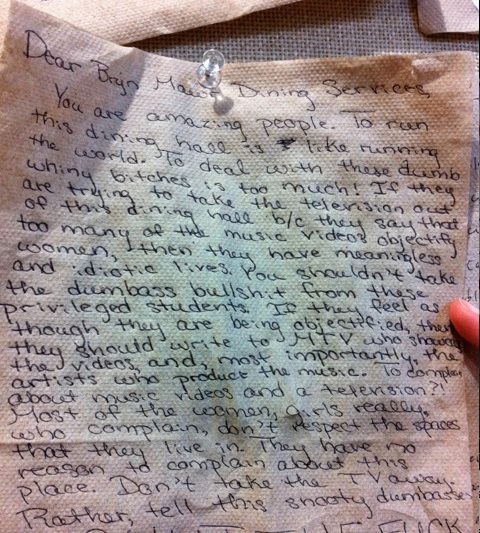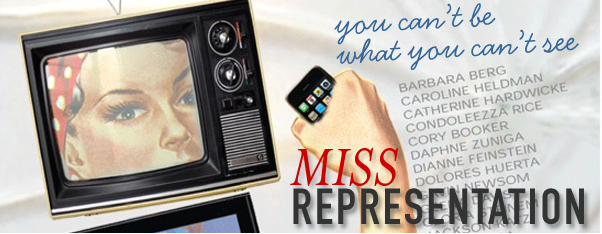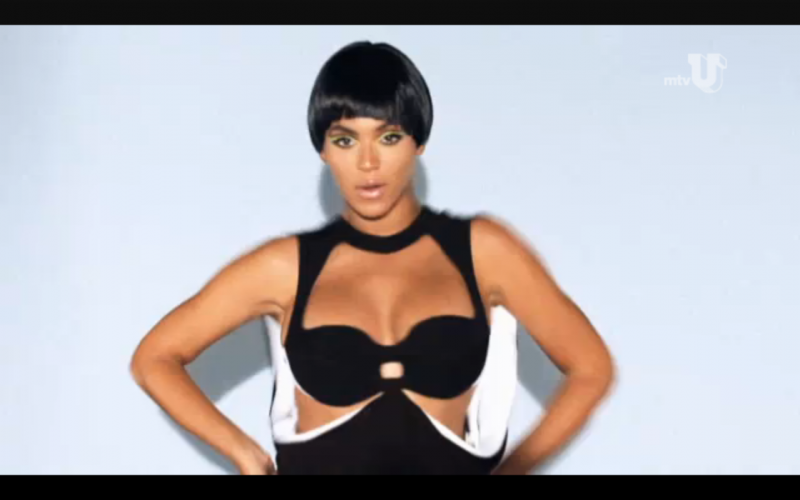Serendip is an independent site partnering with faculty at multiple colleges and universities around the world. Happy exploring!
Classism v. Feminism and Why a Discussion About MTV Can Get Very Complicated Very Fast



“Dear Bryn Mawr College Dining Services,
You are all amazing people. To run this dining hall is like running the world. To deal with these dumb whiny bitches is too much! If they are trying to take the television out of the dining hall b/c they say that too many of the music videos objectify women, then they have meaningless and idiotic lives. You shouldn’t take the dumbass bullshit from these privileged students. If they feel as though they are being objectified, they should write to MTV who shows the videos and, most importantly, the artists who produce the music. To complain about music videos and a television?! Most of the women, girls really, who complain, don’t respect the spaces that they live in. They have no reason to complain about this place. Don’t take the TV away. Rather, tell the snooty dumbasses to SHUT THE FUCK UP! YOU DON’T KNOW WHAT REAL OBJECTIFICATION IS!!!
Sincerely,
c/o 2015
POSSE SCHOLAR”
Confused? I was too.
Actually, my range of emotions went from bewildered to outrage to confusion to (perhaps?) understanding and finally frustration. But in order to get to that, you should know my story.
This story didn’t start out being about class. It was about feminism. It was classically Bryn Mawr. It’s funny, isn’t it, how quickly things change?

A few weeks ago Bryn Mawr College screened MissRepresentation. I had to miss it for a French class, but my roommates and hallmates all went to the screening and came out saying it was one of the most amazing things they’d ever seen. The documentary explores the ways women have been poorly portrayed by the media. The documentary explains that this portrayal needs to change otherwise little girls everywhere will grow up with skewed ideas regarding what it means to be female. My hallmates felt empowered by the film. They wanted to make a difference, but they needed a way to go about doing so.

My friend, Nina*, thought of the television in the back of Erdman dining hall and how the only channel is MTVu (the University/ College version of MTV). She commented on the way the majority of the music videos shown on the television objectify women – and since MTVu primarily shows music videos, that’s a really big deal.
Nina decided that she’d contact Dining Services to see about having the TV removed. Because the TV is own by MTVu, Dining Services said Nina would have to get a petition signed, as they didn’t have the full authority to act on a request like hers. They also sent her pamphlets about the charities MTVu was funding (such as anti-human trafficking programs) in some attempt to discourage her from going through with the petitions.
Soon afterwards, these same pamphlets were taped underneath the television along with two different petition sheets. One said "I DO think MTVu improves my dining experience." The other said, “I do NOT think MTVu improves my dining experience.” Last week I signed the latter sheet. At that point, there where only two spaces left on the petition, compared to the two-thirds empty sheet for keeping the TV. As we were leaving Erdman, we took a look at some of the napkin notes and realized a debate was occurring on the napkins on people’s opinions about keeping or getting rid of the TV.
For those of you who aren’t familiar with napkin notes, they’re a Bryn Mawr Dining Hall institution. Traditionally they’re used to convey notes to the Dining Staff along the lines of a comments or suggestions box. The notes are pinned to a bulletin board for the dining staff and others to read. All of the notes are read and often acted upon: students can request grapes at lunch and see them the next day, for example. Students can also thank Dining Services for a great job. I’ve seen notes that say things like, “Thanks for the amazing soup!” or “Good job on the dessert tonight!” The MTVu conversation changed the dynamic of the Napkin Notes Board, though, because they weren’t directed to the dining staff – they were a conversation between students. When I first saw them, only two had been put up:

“MTV pays for the TV. I personally don’t want the school to pay for additional channels. The Dining hall cannot control the content of MTV and it does not differ from what they put on cable. The only other option would be to not have a TV at all.”

“No TV would be my preference.
– It’s DISTRACTING. Any channel would be.
– I don’t like MTV.
– Free doesn’t make something worth it.
– I don’t think Bryn Mawr should support MTV by selling our uninterrupted dining.
– Everyone I know who watches the TV does so they can make fun of it.
•Please get rid of it•”
Nina and I were excited that napkin notes were being used to host a discussion, as no other forum for voicing opinions on the matter existed. We talked about adding our own comments and a few days later I wrote my note to post on the board:

“I don’t want MTVu in the Dining Halls, because I don’t want to see degrading images of women while eating breakfast. We should be feeling empowered, not overdressed.
~Sophia”
I felt good after adding my own voice. I felt like I was able to explain myself. My friends agreed with my sentiment and commended me for writing a note about it. And then, a few days later, I saw the note we started with.
I was shocked. I couldn’t understand why someone would write something like that and felt the accusations that those of us who disagreed with the presence of the TV were “privileged” were unfair and unfounded. I was also struck by how this conversation very suddenly became about class and not about gender, as it had been to start. We had been labeled “snooty bitches” and we “[didn’t] know what real objectification [was].” After the shock subsided, I was outraged. How dare she accuse me being privileged because I didn’t want to have to watch degrading images of women, in a women’s college? A napkin note written in response to the angry note said, “…to assume (as you seemed to do) that you have a better grasp on what objectification is than your peers, that all but you are privileged, and that one’s level of privilege at all influences one’s ability to be objectified or identify objectification when it is evident is both presumptuous and potentially false.” Put more simply – what gave her the right to say she had a better sense of what it meant to be objectified? What gave her the right to assume the students speaking were privileged? What gave her the right to conflate privilege with the ability to point out objectification? Then I reread the note and noticed she’d identified herself as a Posse Scholar. Now I faced more confusion.
Posse scholars are students who get a special scholarship based on their leadership skills. They have to pass a rigorous set of reviews and interviews before being picked to be Posse Scholars. Once admitted to the Posse Program, scholars meet on a regular basis throughout their senior year of high school to discuss a range of subjects, including race, gender, and class. I’ve met multiple scholars, and they’ve always seemed to be some of the most socially aware students. “Leaders” would be the perfect description. So the assumptions of privilege from this particular student confused me.
When I returned to my room, I decided to talk to one of my hallmates, another Posse Scholar, to see if they’d discussed the topic of MTVu in the dining halls and I told her about the note. To my surprise, she said she could understand both sides of the story. She explained that when she was growing up she watched MTV all the time and, in fact, for a long time she didn’t realize she didn’t have to see those degrading videos. She said she could understand seeing a level of privilege in those who didn’t watch MTV growing up. I was skeptical at first, but then thought about it. I spent my childhood watching Sesame Street and Arthur. My parents are graphic designers. My ex-boyfriend grew up on reality television and music videos. His parents are immigrants to the States and worked low-income, labor-intensive jobs, including housecleaning. Could there be a classed difference in whether or not one grew up watching scantily clad women fawn over rappers?
My hallmate also suggested the Posse Scholar assumed our notes were directed to the staff – who work hard enough as is – instead of towards each other. I realized the purpose of the board, is, indeed, to write to the staff, but had never thought to read the notes as anything but a discussion of the petitions which had been posted.


So I’d come to (almost) understand the student’s strong response. But I still wasn’t satisfied. If watching MTV as a child was, indeed, a sign of class difference, why did degrading women have to be a part of that? I wasn’t convinced that, as this Posse Scholar suggested, I didn’t know what “real objectification” was. In fact, I was pretty sure that showing women in bikinis hanging on the arms of male singers or rappers was inappropriate. Every day, I felt as though I was being reminded that my job as a woman (or girl) was to be seen and not heard. Women in music videos bared as much skin as possible without being completely nude, gasped in suggestive poses, and worked at looking vulnerable. Even Beyoncé – a strong female singer and pop star– resorted to displaying her body in her music videos. I felt as though that was her collateral – don’t like the song? she was saying, don’t worry! You can stare and my toned legs and displayed cleavage.
I understand that removing a television won’t stop MTV from showing videos that objectify women. I also understand that not everyone has the option to not view this objectifying media. I understand why the issue became classed. However, I do think removing a TV which is currently owned by a piece of the MTV corporation is taking a step. Do I believe artists won’t continue to make offensive music and music videos? Not immediately. But I also don’t think we should be forced to watch something we don’t want to, especially at a school where empowerment is one of the main goals. As one napkin note writer said, “Free doesn’t make something worth it.” And in my opinion, MTV is just not worth it.
*Name has been changed
Images of Beyoncé are from her music video, "Countdown," – as viewed on MTVu.
The MissRepresentation picture is from their promotional material on UMBC's website. (University of Maryland, Baltimore County: umbc.edu)
Names on the Napkin Notes, excepting my own, have been erased for anonymity.



Comments
Sexism in Music
I can't help but guide some of you to a disturbing music video by Natalia Kills, "Kill My Boyfriend." I was directed to this atrocity by a friend, and trying to spread some of my discontent to interested listeners. How one can complain about women being discriminated against in the media is beyond my comprehension in this current century. Take a look at the aforementioned video, listen to the lyrics, and decide for yourself:
http://www.youtube.com/watch?v=-daPmzKLKNU&ob=av2n
The blatant violence manifests itself about a third of the way through. We're repeatedly exposed to gun shots, knives, slapping, pouring liquids, and a few other things done to her imagined boyfriend all before we get the pleasure to see her drown him in a bathtub. It's horrifying to see this disgusting double standard being taken so lightly, and very few men have the gall to call a spade a spade. Please get back to me if you find yourself agreeing or disagreeing with this sentiment. I've NEVER seen a man exhibit this type of behavior towards a woman in a music video, and the only thing close would either be shunned immediately, so found in some remote part of the hip hop universe.
Thank You,
Spencer
srginosu@aol.com
sabbot, This is a complex and
sabbot,
This is a complex and compelling piece in which you try to disentangle issues that are also complex and compelling...and difficult to disentangle! The responses to your post, the ongoing conversations via napkin notes and in person, and your later post all attest to the importance of being in these dialogues, which to me exemplify an intense, dynamic connections between 'intellectual' matters and 'real' or daily life--what we do, who we are, how we feel, think, move, dress... The question of how people were raised as a way of understanding how they/we perceive and act in the world is itself complex. Just because someone was raised one way or another doesn't necessarily mean that I/we must agree with their perspective and actions--this would leave no opening for change--but on the other hand hearing/reading about how different folks came to different understandings can open new pathways in our own perspectives/actions (see Rae Hamilton's web paper, for ex.), which is at the heart of change. This is what I find so exciting here...
Honestly
Honestly....I see it from both views. I don't really see what she did was wrong except for identifying herself as a posse scholar instead of by her actual name. I feel like if you don't want to watch the videos then there other rooms to eat in where you can't see the tv. I'm not for objectification but are you telling me that you don't listen to this music? If the musics are that degrading thenthe boycott should not be just the tv but the artists as well. Moreover, the problem with society and media is because people are too caught up in the 'fake reality.' In the past, movies were to allow people to escape from everyday life. Now you see tv trying to transition in reality, everyone wants to be able to 'connect.' The bigger question is, where are people's parents? Sophia, you mentioned your family and how you weren't raised on MTV like your ex was. I feel like one's family and class is what creates their view on gender. So I see why gender and class are so intertwined with one another. I don't have a problem with music videos because I know it is just a music video. I think the whole taboo about sex and exposure is actually creating this tension because it's never talked about. If parents were to explain to kids what they were watching, I think many young girls AND boys would have a better time with separating real and art. I think it's also a little classed to look at the way she wrote the napkin note. While many people are turned off by her 'vulgar' language, at the end of the day she spoke her mind in the heat of the moment and if that is how she talks, that's how she talks. I think (and yes I'm making an assumption right now) if she would have not used 'dumb ass' or 'snooty' and used more classier words would you be as offended?
Thanks for bringing up those
Thanks for bringing up those points! I agree, that if she'd used more "classier" words, I don't think offended would have been my first reaction – however, I do think her response would have sparked discussion because we both had such strong feelings regarding the television's presence.
What you said about family was really important – I think there's definitely a cultural connection with how the videos are viewed. I also agree that there's a larger matter at hand involving the artists. At the moment, I'm just not sure what we should do or how we should do it. While writing this post I felt the MTVu issue was just a beginning.
I would also like to add that the writer of the napkin note did sign her (full) name on the note itself. In my photograph of it, I removed her name for the sake of online anonymity.
I hadn't read this tonight
I hadn't read this tonight before the performances, but I was told that it couldn't be explained and I had to see it myself. Wow, this was a powerful post. I want to echo Chandrea and say thank you for having so much respect for Posse and explaining it in such a positive manner!
Also, this is just SUCH an interesting issue in general. Before I came to Bryn Mawr, I didn't really know much about sexism and when I arrived I definetly thought that being a feminist is not something I wanted to be associated with. Overtime, my views changed today I proudly call myself a feminist, but I will (shamefully) admit my freshmen year when people were talking about sexism I really didn't understand what they were "complaining" about. I'm kind of rambling, but I hope you have some idea of what I am saying!
Also, I LOVED Miss Representation!!
I really liked and respect
I really liked and respect your response to the post! As POSSE scholars, we do not understand why the scholar in question chose to display her "leadership" in that manner---our fellow POSSE scholars agree that the napkin note was innappropiate. Although POSSE encourages discusson about issues on campus, we have never been advised to do so with swearing and assumptions about groups of people. We hope that this napkin note has not altered our image and our positive leadership on campus. All of us in POSSE apologize to anyone who is offended by the statement made in the napkin note. We will address the note with the scholar as soon as possible.
Sincerely,
Chandrea Peng and Esteniolla Maitre
I also really appreciated
I also really appreciated your response! Thank you, both, so much for stepping forward. I definitely won't let the words of one scholar affect my view of the group as a whole – especially as I know many of you and am constantly impressed by your actions and interactions!
Thank you again!
Chandrea, this response is
Chandrea, this response is wonderful.